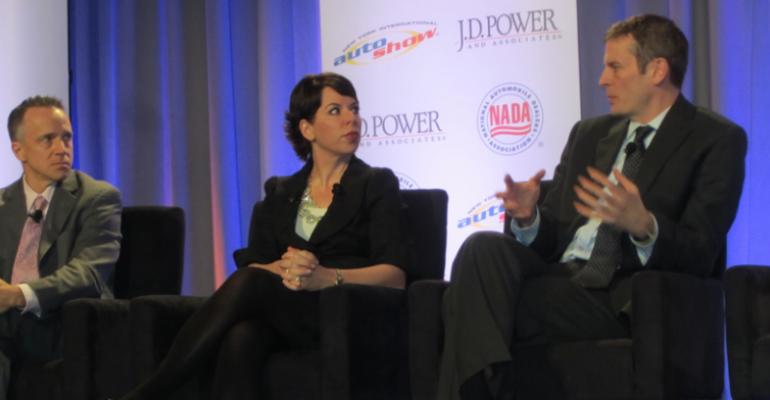NEW YORK – Lincoln’s toughest competitor isn’t another luxury brand as much as its stronger big brother Ford in some markets.
That’s an irony offered by Matt VanDyke, director-global Lincoln marketing, sales and service, speaking as part of a panel at an automotive conference here put on by J.D. Power and Associates and the National Automobile Dealers Assn.
It is not uncommon for a so-called “dualed” dealership to sell both Ford and Lincoln models, especially since the 2011 demise of the Mercury brand, which had been partnered with Lincoln dating to 1945.
Today, Ford does well and Lincoln struggles for sales and market share. “We need to be dead honest,” VanDyke says. “In those dualed Ford-Lincoln stores, you can be very successful as a Ford dealership alone.”
That makes it vital for Lincoln to set itself apart and capture a share of mind not only from customers but also from dealership salespeople who may find Ford the easier sell.
Lincoln is trying to distinguish itself through a variety of customer-care training for dealership personnel.
Virtually all luxury brands do that, but Lincoln does it a bit differently by giving individual dealers more latitude in “taking care of customer expectations in their own way,” VanDyke says during the conference, held in conjunction with the New York International Auto Show.
Lincoln’s approach is to encourage its dealers to act like small-town business people in a way. “Some luxury brands have built facilities so big, they’ve become impersonal,” VanDyke says. “We want to provide that personal touch like the local barber does. We’re focusing on that.”
Nissan’s Infiniti luxury brand is relying on advanced technology and customer pampering to attract and keep premium buyers, says Ben Poore, vice president-Infiniti Americas.
He cites an upcoming Infiniti safety feature: a collision-avoidance radar system that not only detects a car stopped directly ahead, but also a vehicle stopped two cars ahead.
“That is not something a driver needs every day, but it is something that distinguishes us,” Poore says.
He also touts the Infiniti Personal Assistant telematics program that offers subscribers concierge services ranging from recommending restaurants to booking tee times.
“I don’t want to tell you some of the things people have asked for, but what we have seen with this service is that customer loyalty has gone up dramatically,” Poore says.
As far as going even more than the extra mile to satisfy customers, he tells of a dealer who drove two hours to deliver a key and fob to replace one an Infiniti customer had lost at an airport. “When something like that happens, you don’t just have a customer for life, you have one for generations.”
Poore also points to the importance of an Infiniti incentive program that provides bonuses to retain outstanding dealership employees, from salespeople to service advisers. “As employee retention goes up, so does customer retention.”
Premium consumers not only are attracted to a “cool” car, they also are drawn to the luxury car-buying experience, says Michelle Morris, Google’s automotive industry director.
Premium cars sell well in New York, which is why several high-end auto makers unveil models at the New York auto show, says Mark Schienberg, president of the Greater New York Automobile Dealers Assn., which puts on the event.
“You can’t pigeonhole a metro market, but luxury autos are an important part of this one,” he tells WardsAuto.
It’s notable that the new Range Rover Sport makes its world debut at the New York show, dealer association spokesman Nick Crispe says. The British auto maker sells more Range Rover Sports in New York than in any other metropolitan area in the world.
“Usually, you think of a Range Rover world debut as occurring at a European auto show like Geneva’s,” Crispe, a U.K. native, tells WardsAuto. “But to have one here in New York is really something.”
New York’s place as the center of the U.S. financial community drives a lot of luxury-car sales, says Paul Taylor, NADA’s chief economist. “But the sheer size of the market has something to do with it, too.”
He debunks a common perception that New Yorkers don’t own or drive cars. “You’d be surprised at how many cars are tucked away in Manhattan or across the Hudson River in New Jersey.”
Car ownership in New York comes with high ancillary costs, Taylor notes. “The price for a parking spot here can rival the cost of a condo somewhere else.”





